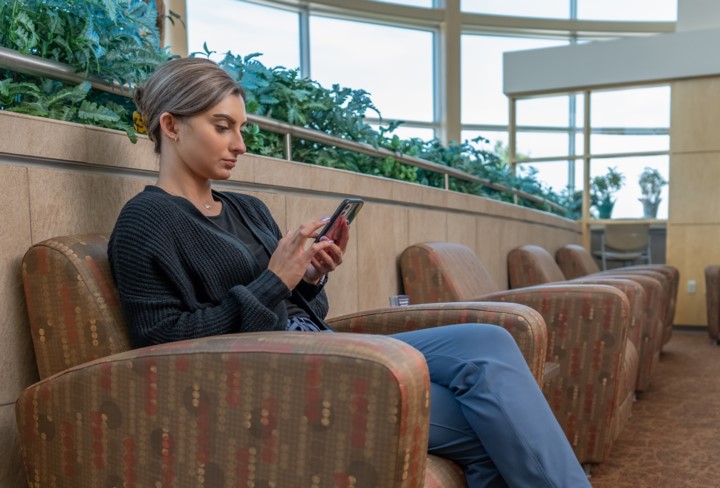Penrose Lung Nodule Clinic
The Penrose Lung Nodule Clinic is part of a multidisciplinary team. Our purpose is to find cancers as early as possible by ensuring lung nodules are monitored per national guidelines. For the small percentage of nodules that are cancer, thoracic nurse navigators coordinate a team of cancer specialists to provide high-quality cancer care.
Penrose Lung Nodule Clinic exceeds benchmarks
While most lung nodules are not cancerous, the small number that are require appropriate intervention. We schedule appointments as soon as possible for any lung nodules that look like cancer. Our clinic’s latest patient referral-to-appointment for these cases was five days. Every new case is reviewed within two business days.
When a nodule is suspicious for cancer, a multidisciplinary team collaborates to ensure the best possible care and most appropriate diagnostic strategies. For additional questions about the Penrose Lung Nodule Clinic, please call (719) 776-6997.
Our Services
The Penrose Lung Nodule Clinic exists to find cancers as early as possible. Our team of experienced thoracic nurse navigators ensure lung nodules are monitored according to national guidelines.
Most nodules are not cancer, but when a nodule looks like cancer, thoracic nurse navigators expedite care and connect patients with a specialist as soon as possible. The Penrose Lung Nodule Clinic collaborates with specialists who are trained to use innovative technology to biopsy smaller lung nodules when indicated.
The Penrose Lung Nodule Clinic is part of a multidisciplinary team of cancer specialists who collaborate weekly to ensure each person receives the best possible cancer care tailored to their specific needs. Services include lung nodule monitoring, ION bronchoscopy, multidisciplinary care planning and nurse navigation for lung cancer.
Lung Nodule Monitoring
The monitoring program at the Penrose Lung Nodule Clinic provides timely, coordinated patient support, expert interdisciplinary care planning, and communication of results with patients and their primary care providers.
Lung nodules may be found via:
- Chest X-ray or CT scan – often found incidentally when performed for another reason
- Lung cancer screening – a low-dose CT scan specifically to screen for lung cancer
- Cancer surveillance – imaging scans that watch for cancer in people who have completed cancer treatment
Our team of thoracic nurse navigators ensures nodules are monitored per national guidelines, and imaging is reviewed by a specialist from the multidisciplinary team.
Multidisciplinary Care Planning
Each week, the multidisciplinary team collaborates on complex patient cases and develop care plans tailored to each patient’s specific needs. The following disciplines or specialties are included in this regular multidisciplinary planning session:
- Cardiothoracic surgery
- Medical oncology
- Pathology
- Pulmonology
- Radiation oncology
- Radiology
Nurse Navigation – Lung Cancer
People diagnosed with cancer who work with nurse navigators have better outcomes and their care is better coordinated.
Our team of experienced thoracic nurse navigators work closely with patients from diagnosis through cancer treatment.
Nurse navigators support patients in overcoming barriers to care and coordinate diagnostic work-up for suspicious lung nodule findings, including navigational bronchoscopy and imaging tests like PET scans and MRIs.
Navigational Bronchoscopy Technology
Specialists receive training in robotic-assisted bronchoscopy to perform minimally invasive procedures to diagnose cancers found in the lung. This technology allows the specialist to reach smaller lesions that are more peripherally located with greater precision than other technologies. This is important because 70% of cancerous lung nodules may be located in the peripheral lung.
Conditions we treat
- Benign lung nodules and lung masses
- Lung cancers
- Metastatic disease in the chest
- Thoracic lymphadenopathy
FAQs
Lung nodules are spots or growths in the lungs. One in four people who have a CT scan have lung nodules and most are found during an X-ray or CT scan for something else. Luckily, 98.7% of lung nodules are not cancer.
Watching lung nodules over time is a way to find cancer as early as possible and before it spreads. If a nodule is large or a certain shape, a doctor may recommend a biopsy, which collects and examines cells under a microscope to help diagnose cancer or other diseases. Biopsy can be done by bronchoscopy, navigational bronchoscopy, interventional radiology or surgery.
If a biopsy of a lung nodule shows cancer, your team of doctors may use the following tests to determine the best treatment option for you: lung function tests, CT scan of your chest, PET scan, MRI of your brain and/or DNA testing on cells from a biopsy.
Quitting tobacco is the best way to lower the risk for lung cancer. Like watching nodules, lung cancer screening is a way to find cancer as early as possible and before it spreads. Talk to your doctor about quitting tobacco and lung cancer screening.
Patient Resources





